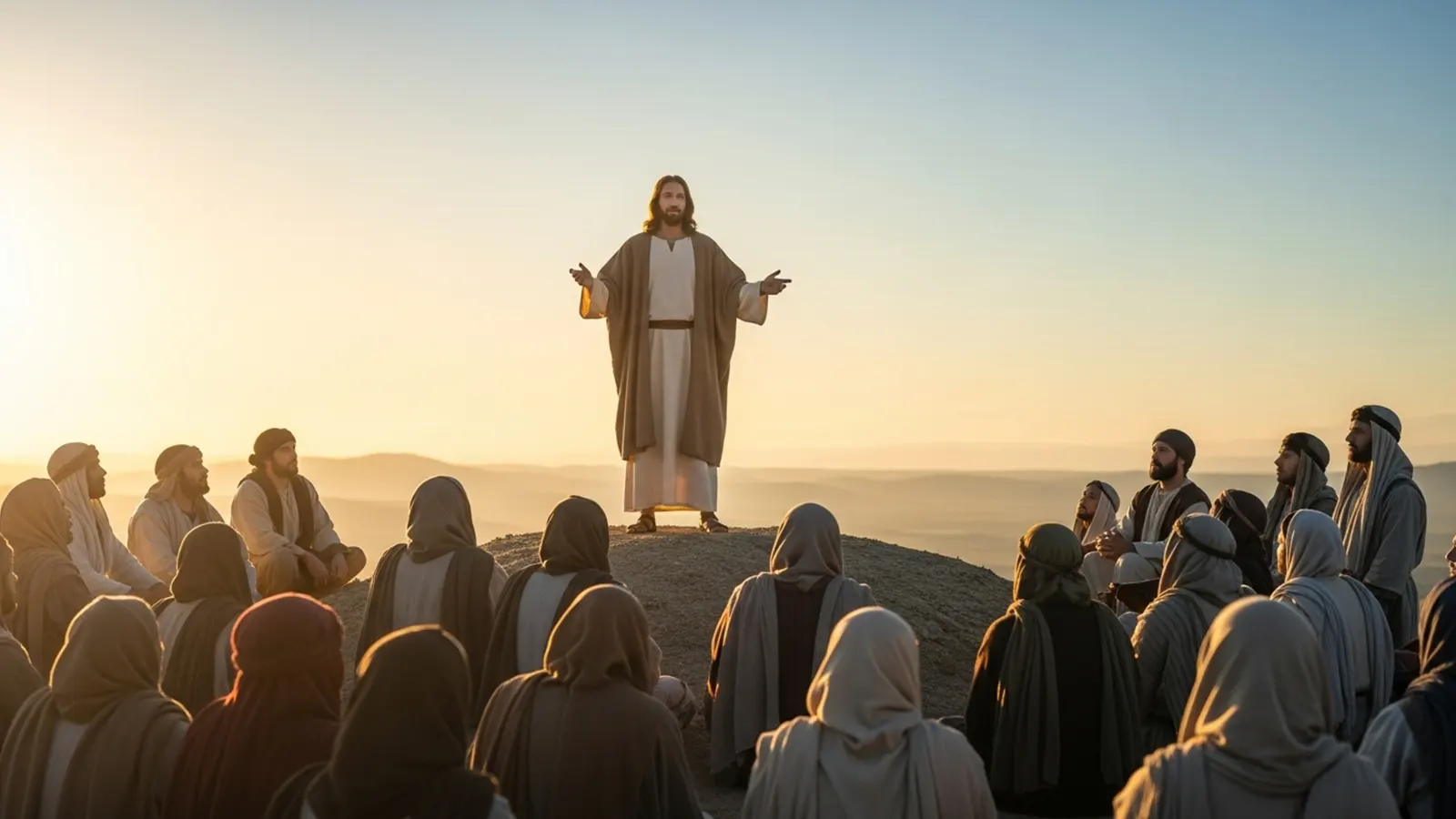The passage of Luke 12:2–10 is one of the most profound in the Gospel. Jesus teaches that nothing is hidden before God, that truth always comes to light, and that faith must be confessed publicly.
These words reveal three spiritual pillars that shape the Christian life: integrity and transparency before God, holy fear that frees us from human fear, and the courage to confess Christ before others.
As we study Luke 12:2–10, we understand that the Gospel is not only a message for the heart, but a call to consistency and faithfulness.
Table of Contents – Straight to the Point
Quick Summary
Luke 12:2–10 teaches that nothing is hidden before God, that the truth will always be revealed, and that faith must be lived with courage and sincerity.
Jesus warns against hypocrisy and the fear of people, reminding us that we should fear God alone—the only One who has power over the soul. He assures us that the Father knows every detail of our lives, even the hairs of our head, and invites us to trust fully in His care.
The passage also highlights the importance of publicly confessing Christ and warns about the danger of rejecting the Holy Spirit, who convicts and transforms the human heart.
In short, Luke 12:2–10 is a call to truth, courage, and living faith—a life without masks, guided by God’s light and sustained by the Holy Spirit.
Luke 12:2–10
² For there is nothing covered that will not be revealed; nor hidden that will not be known.
³ Therefore whatever you have said in darkness will be heard in the light; and what you have spoken in the ear, in inner rooms, will be proclaimed on the housetops.
⁴ And I say to you, my friends: Do not fear those who kill the body and after that have no more that they can do.
⁵ But I will show you whom you should fear: fear Him who, after He has killed, has power to cast into hell; yes, I say to you, fear Him.
⁶ Are not five sparrows sold for two asses? And not one of them is forgotten before God.
⁷ But the very hairs of your head are all numbered. Do not fear therefore; you are of more value than many sparrows.
⁸ Also I say to you, whoever confesses Me before men, the Son of Man also will confess him before the angels of God.
⁹ But he who denies Me before men will be denied before the angels of God.
¹⁰ And anyone who speaks a word against the Son of Man, it will be forgiven him; but to him who blasphemes against the Holy Spirit, it will not be forgiven.
The Context of Luke 12:2–10
Jesus speaks these words while a crowd surrounds Him. He addresses the disciples in particular and warns against the hypocrisy of the Pharisees.
The scene presents an environment of great tension and religious opposition, teaching about living faith without masks and preparing the disciples for times of persecution.
The focus of Luke 12:2–10 is to teach that the true disciple lives in truth, even when it is costly. Jesus does not promise human safety, but He promises God’s constant presence.
Nothing Is Hidden Before God
Jesus begins by saying: “Nothing is covered that will not be revealed, nor hidden that will not be known.”
This statement is a spiritual key. In Luke 12:2–10, He reminds us that God sees what is inside, not just what is shown on the outside.
Lessons this verse teaches us:
• There are no secrets before the Creator.
• Integrity is more important than appearance.
• Truth will always prevail, sooner or later.
To live in God’s light means not fearing exposure, because the heart has already been purified by grace.
The Power of Truth
In times of appearances and disguises, Luke 12:2–10 is even more timely. Jesus makes it clear that truth is unbeatable. Everything said in secret will one day be revealed, and what is done in the shadows will be brought to light.
Practical applications:
• Speak with sincerity and live with clarity.
• Avoid a double life.
• Trust that divine justice will reveal what needs to be exposed.
Truth is the ground where faith flourishes. God honors those who live with transparency, even when the world prefers dissimulation.
Do Not Fear Men, But Fear God
In Luke 12:4, Jesus says:
“Do not fear those who kill the body and after that can do no more.”
Here He establishes a fundamental difference between human fear and divine fear.
Human fear arises from insecurity and the desire for acceptance, paralyzing us before worldly pressures. The fear of God is reverence and respect for His authority, freeing us from human opinions and keeping us firm even amid trials.
Living the gospel requires courage. Luke 12:2–10 teaches that fearing God is the path to overcoming fear and remaining faithful.

Holy Fear and the Value of the Soul
Jesus continues:
“Fear Him who, after He has killed, has power to cast into hell.”
These words, found in Luke 12:5, remind us that there is something far more important than the body: the soul.
Three spiritual truths present here:
- The body is temporary, but the soul is eternal.
- True fear is spiritual, not merely emotional.
- Love and reverence for God produce security, not terror.
Holy fear does not drive us away from God. On the contrary, it draws us near to Him with humility and obedience.
God Cares for Every Detail
In Luke 12:6–7, Jesus uses the image of sparrows to show divine care:
“Are not five sparrows sold for two asses? Not one of them is forgotten before God.”
These words reveal that God watches even the smallest creatures, that no detail goes unnoticed, and that if He cares for the birds, He will care even more for His beloved children.
Jesus adds: “The very hairs of your head are all numbered.”
It is one of the tenderest declarations in the Gospel. It shows that the same God who is just and powerful is also a compassionate Father.
The Public Confession of Faith
Verse 8 of Luke 12:2–10 states:
“Whoever confesses Me before men, the Son of Man also will confess him before the angels of God.”
The confession of faith is the seal of discipleship. To confess Jesus is to acknowledge publicly that He is Lord, to live so that faith is visible, and to remain steadfast even in the face of opposition.
The promise is glorious: those who confess Christ on earth will be acknowledged by Him in heaven. This is the reward of a faithful witness.
The Seriousness of Denying Christ
Jesus also warns:
“He who denies Me before men will be denied before the angels of God.”
Luke 12:2–10 shows that faith cannot be silent or disguised. Denying Christ is much more than words; it is to live in a way that contradicts the gospel.
Examples of denial:
• When we prefer to please people rather than obey God.
• When we hide our faith for fear of criticism.
• When we fail to act justly to keep up appearances.
Following Jesus demands faithfulness. Denial can be subtle, but true love always manifests itself in obedience.

The Sin Against the Holy Spirit
Verse 10 of Luke 12:2–10 addresses the famous unforgivable sin:
“He who blasphemes against the Holy Spirit will not be forgiven.”
What this means:
• It is not a simple mistake or doubt.
• It is the deliberate rejection of the Spirit’s work.
• It is the hardening of the heart against grace.
The Holy Spirit is the One who convicts, comforts, and transforms. When someone completely rejects Him, they close the door to repentance. This is the essence of Jesus’ warning: do not harden your heart.
Practical Applications of Luke 12:2–10
Jesus’ teaching is direct and applicable at any time. To live what Luke 12:2–10 teaches:
- Pursue integrity—be the same in public and in private.
- Fear God, not people, trusting in the Father’s power.
- Confess your faith through actions and words.
- Listen to the Holy Spirit and allow Him to lead you.
- Trust in divine care in every detail of life.
These attitudes form the foundation of a mature, strong, and genuine faith.

The Strength of Testimony
Living Luke 12:2–10 is living in the light. The authentic Christian does not fear being seen, because their life reflects God’s presence.
True testimony is consistent and constant. It convinces more by actions than by words and shows the world the transforming power of the Gospel.
To witness is to confess Christ with one’s own life—and that is more powerful than any speech.
Living in the Light of Truth
The call of Luke 12:2–10 is to live without masks. God does not seek outward perfection, but sincere hearts.
Principles for living in the light:
• Allow God to reveal what needs to change.
• Abandon hidden sin and walk in transparency.
• Seek daily to be shaped by the Word.
Truth sets free, the Spirit guides, and God’s love sustains. Those who walk in the light do not fear judgment, because they already live in the presence of truth.
Conclusion
Luke 12:2–10 is one of the most transformative passages in the Gospel. It teaches us that nothing is hidden before God, that holy fear is liberating, and that the confession of faith is a mark of the true disciple.
To live this message is to allow the light of Christ to reveal what is within us and lead us to authenticity. May our words and actions confess Jesus every day—and may we be acknowledged by Him before the Father.
FAQ — Frequently Asked Questions about Luke 12:2–10
What does Luke chapter 12 verse 2 say?
This verse declares that nothing remains hidden before God. Everything that is covered will be revealed, and everything concealed will be known. The central message is about spiritual transparency and truth: God sees the heart and judges with justice.
What does Luke 12:10 mean?
In this passage, Jesus speaks about the seriousness of rejecting the work of the Holy Spirit. The text teaches that blasphemy against the Spirit is the act of deliberately resisting God’s grace and His convicting work. It is a warning to keep the heart sensitive and obedient to the divine voice.
What does Luke 12 teach us?
Luke 12 is a powerful lesson on authenticity, trust, and faith. It teaches that nothing is hidden before God, that we must fear Him more than people, and that we must confess Jesus publicly. It also reinforces that the Father cares about every detail of His children’s lives.
What did Jesus mean when He said that Mary chose the good part?
Although this sentence belongs to Luke 10:42, it connects spiritually with the teaching of Luke 12:2–10. Jesus showed that the “good part” is to sit at His feet, listening to and obeying the Word. While Martha was concerned with tasks, Mary chose what is eternal: communion with the Lord.
READ ALSO:
- Do Not Be Anxious About Anything: An Invitation to Trust in God
- Reflection on the Return of Jesus: A Call to Be Ready
- What the Bible Says About Death: A Vision of Hope and Eternity
FOLLOW US ON FACEBOOK
I hope you enjoyed it